Top Ball Valve Manufacturers and Suppliers in Japan
Content Menu
● Japan's Distinct Edge in Ball Valve Manufacturing
● Industry Leaders in Japanese Ball Valve Manufacturing
>> Kyoto Valve & Control (KVC)
● Expanding Applications of Japanese Ball Valves
>> Water Treatment and Desalination
>> Pharmaceutical and Food Production
>> Chemical and Petrochemical Industries
>> Marine and Offshore Platforms
● Innovations and Advanced Technologies
● OEM Manufacturing Services: Partnering for Global Success
● Frequently Asked Questions (FAQs)
>> 1. What types of ball valves do Japanese manufacturers typically produce?
>> 2. Are Japanese ball valves suitable for offshore and subsea use?
>> 3. Can I order custom OEM ball valves from Japanese suppliers?
>> 4. Do Japanese ball valves support automated and remote control operations?
>> 5. What certifications do Japanese ball valve manufacturers commonly hold?
Japan is renowned worldwide for its precision engineering, innovative manufacturing, and commitment to quality. This reputation extends strongly into the realm of ball valve production, where Japanese manufacturers and suppliers have established a global leadership position. With decades of expertise, these companies produce a wide variety of high-performance ball valves that serve crucial roles in demanding industries, including upstream, midstream, and downstream oil and gas, offshore drilling platforms, seawater desalination, chemical processing, pharmaceuticals, and food production.
This article delves into the top ball valve manufacturers and suppliers in Japan. It highlights their technological advancements, product ranges, and industry contributions. Additionally, this overview addresses their OEM service capabilities and the innovative trends shaping the future of ball valve technology in Japan.

Japan's Distinct Edge in Ball Valve Manufacturing
Japanese ball valve manufacturers distinguish themselves through their relentless pursuit of quality, efficiency, and innovation. Grounded in the principles of Kaizen (continuous improvement) and leveraging advanced materials science, robotics, and digital monitoring systems, these companies produce valves that withstand the harshest industrial conditions.
Many of the Japanese manufacturers participate actively in international standards committees and frequently exceed global certification requirements such as ISO 9001, API 6D, and ATEX. Consequently, Japanese ball valves are preferred by global buyers seeking reliability, safety, and precision in their flow control devices.
Industry Leaders in Japanese Ball Valve Manufacturing
Kyoto Valve & Control (KVC)
Established over half a century ago, KVC started as a valve repair workshop but quickly expanded into a leading manufacturer of industrial ball valves and butterfly valves. KVC's pioneering work in low-temperature stainless steel ball valves positioned them as innovators in cryogenic applications. Their exclusive floating ball design, known as the “K-Seal™,” provides superior sealing performance with minimal emissions, crucial for environmentally sensitive operations.
KVC offers manual, automated, and SCADA-controlled valve assemblies to meet increasingly complex process control demands. Their rigorous testing programs simulate pressures up to 2,000 bar and temperatures as low as -196 °C, ensuring product robustness for offshore and petrochemical clients.
Sawamura Valve Co., Ltd.
Operating since 1931, Sawamura Valve is renowned for its expertise in trunnion and floating ball valves designed for high-pressure and subsea applications. Their forged body valves combine durability and precision, supported by certifications verifying exceptionally low fugitive emissions.
Sawamura's products serve critical roles in oil and gas pipeline infrastructure, processing facilities, and offshore drilling rigs, where valve failure is not an option. Their multi-port and subsea ball valves support complex flow control configurations in challenging environments such as deepwater operations.
Hisaka Valve Division
Hisaka Valve targets sectors requiring sanitary and cleanroom-compatible valves, including pharmaceuticals, food processing, and fine chemicals. Their “CleanLogic™” series features FDA-approved seals and metal-free flow paths, eliminating contamination risks in hygienic applications.
In addition, Hisaka has a strong presence in actuated valve assemblies, offering pneumatic and electrically driven ball valves with rapid response times. The company's innovations earned the prestigious JSME Award for Mechanical Engineering Innovation, reflecting their leadership in integrating mechanical design with automation.
NBV Co., Ltd.
NBV's evolution from brass fittings to advanced stainless steel valves reflects its commitment to innovation. The introduction of self-lubricating seats in the 1980s significantly cut valve maintenance intervals, a vital improvement for industries operating on continuous schedules.
Today, NBV's portfolio includes cast stainless steel ball valves, specialized subsea models, and smart valves embedded with sensors for real-time monitoring. Their focus on valve automation and instrumentation addresses the growing demand for intelligent, connected industrial devices.
NDV Co., Ltd.
NDV's long history includes pioneering work in double-block-and-bleed trunnion ball valves, which remain industry benchmarks for offshore oil and gas applications. Employing cutting-edge engineering methods such as Computational Fluid Dynamics (CFD) and Finite Element Analysis (FEA), NDV optimizes valve design for minimal pressure loss and maximized reliability.
Their expertise spans high-pressure valves used in severe service conditions, ensuring compliance with North Sea and other offshore regulatory standards.
Expanding Applications of Japanese Ball Valves
Oil and Gas Sector
Japanese ball valve manufacturers supply valves that meet complex operational needs in upstream exploration, midstream transportation, and downstream refining. Their products withstand aggressive media, extreme temperature swings, and high mechanical stresses.
Subsea ball valves capable of deepwater operation feature robust sealing mechanisms and corrosion-resistant alloys, critical to preventing leaks and ensuring platform safety. Floating ball valves provide enhanced sealing flexibility in fluctuating pressure scenarios, while trunnion-mounted designs excel in larger diameters and higher pressure ratings.
Water Treatment and Desalination
Japan's expertise in corrosion-resistant materials translates well into the water treatment and desalination industry. Valves controlling the flow of seawater and waste treatment effluent are built to resist the harsh effects of saltwater, chlorines, and biological contaminants.
Precision in valve operation is vital to the treatment process, preventing backflow contamination and ensuring consistent purification results. Japanese manufacturers also emphasize long service life and ease of maintenance, key factors in utility-scale water infrastructure.
Pharmaceutical and Food Production
In these sectors, contamination control and traceability are paramount. Japanese cleanroom-compatible ball valves with FDA-approved seals and metal-free internal pathways maintain the integrity of pharmaceutical ingredients and food products.
The valves incorporate hygienic design principles such as smooth interiors for easy cleaning and minimal dead legs that trap product. Automated valves integrated with control systems help facilities comply with Good Manufacturing Practice (GMP) regulations and maintain efficient production lines.

Chemical and Petrochemical Industries
Japanese ball valves are tailored to handle highly corrosive and toxic media found in chemical plants. Advanced alloys such as Hastelloy, Inconel, and duplex stainless steels are employed to combat corrosion and erosion.
Innovative valve designs ensure tight shutoff and minimal fugitive emissions, supporting environmental compliance in sensitive areas. The manufacturers also develop compact valve assemblies that reduce piping complexity and enhance process flexibility.
Marine and Offshore Platforms
Operating in extreme marine environments, Japanese ball valves are designed to resist seawater corrosion, biofouling, and mechanical shocks from vessel movement or wave action. The valves integrate seamlessly with remote-monitoring systems to provide operators real-time status updates, enhancing operational safety.
Robust actuators and fail-safe mechanisms ensure these valves operate reliably under emergency conditions, critical to offshore platform safety protocols.
Innovations and Advanced Technologies
Japan's ball valve industry is embracing Industry 4.0, IoT, and digital transformation to deliver unprecedented levels of control and efficiency. Smart ball valves equipped with embedded sensors can monitor valve position, pressure, temperature, and leakage in real-time. This data integrates into centralized control systems for proactive maintenance, reducing downtime and preventing failures.
Materials science continues to advance, with Japanese R&D focusing on novel seal compounds, surface coatings, and composite materials that extend valve life and performance in previously unattainable conditions. Additive manufacturing techniques further accelerate prototyping and custom valve development.
Automation technologies such as fast-acting electric and pneumatic actuators enable precise, reliable remote control for complex process environments. These advancements facilitate seamless integration of ball valves into automated plant systems worldwide.
OEM Manufacturing Services: Partnering for Global Success
Japanese ball valve manufacturers offer comprehensive OEM services, tailoring valve designs and materials to meet the exacting requirements of international clients. This collaboration includes custom engineering, flexible production volumes, thorough testing, and logistics support.
Such partnerships enable foreign brands, wholesalers, and producers to leverage Japanese precision engineering and technology while maintaining their product identity and customer relationships. The capacity to produce specialized valves for niche applications and meet strict quality controls makes Japanese OEMs highly sought-after partners.
Conclusion
Japanese ball valve manufacturers and suppliers continue to lead the global valve industry by combining rigorous quality standards, cutting-edge technology, and deep engineering expertise. Their products cater to a broad spectrum of demanding industries—including oil and gas, water treatment, pharmaceuticals, chemical processing, and marine applications—delivering performance, safety, and reliability.
Whether you need standard or custom ball valves, manual or automated, Japanese manufacturers offer solutions designed to withstand extreme environments and stringent operational requirements. Their adoption of Industry 4.0 technologies and commitment to innovation ensure these valves remain at the forefront of flow control technology.

Frequently Asked Questions (FAQs)
1. What types of ball valves do Japanese manufacturers typically produce?
Japanese manufacturers produce a comprehensive array of ball valves—including floating ball valves, trunnion-mounted ball valves, multi-port configurations, cryogenic valves, subsea valves, and cleanroom-compatible models—tailored to diverse industrial applications.
2. Are Japanese ball valves suitable for offshore and subsea use?
Yes, many Japanese ball valve manufacturers design robust valves specifically for offshore platforms and subsea environments, prioritizing high pressure ratings, corrosion resistance, and double-block-and-bleed seal configurations to meet rigorous safety standards.
3. Can I order custom OEM ball valves from Japanese suppliers?
Absolutely. Most Japanese manufacturers provide OEM services, allowing clients to customize valve designs, select specific materials, and integrate desired actuation or control systems to satisfy precise operational needs.
4. Do Japanese ball valves support automated and remote control operations?
Yes, automation is a key focus area, and many Japanese ball valves come equipped with pneumatic or electric actuators. Some even include IoT-enabled sensors for remote monitoring and control, facilitating predictive maintenance and integration into Industry 4.0 environments.
5. What certifications do Japanese ball valve manufacturers commonly hold?
Japanese manufacturers typically hold ISO 9001 certification and comply with industry standards such as API 6D, CE marking, and ATEX. These certifications ensure consistent product quality and adherence to international safety and environmental requirements.
Hot tags: Top Ball Valve Manufacturers Japan, Best Ball Valve Suppliers Japan, High Quality Ball Valve Manufacturers Japan, Custom Ball Valve Suppliers Japan, Industrial Ball Valve Manufacturers Japan, Professional Ball Valve Makers Japan, Wholesale Ball Valve Suppliers Japan, Durable Ball Valve Manufacturers Japan, Leading Ball Valve Exporters Japan, Stainless Steel Ball Valve Suppliers Japan